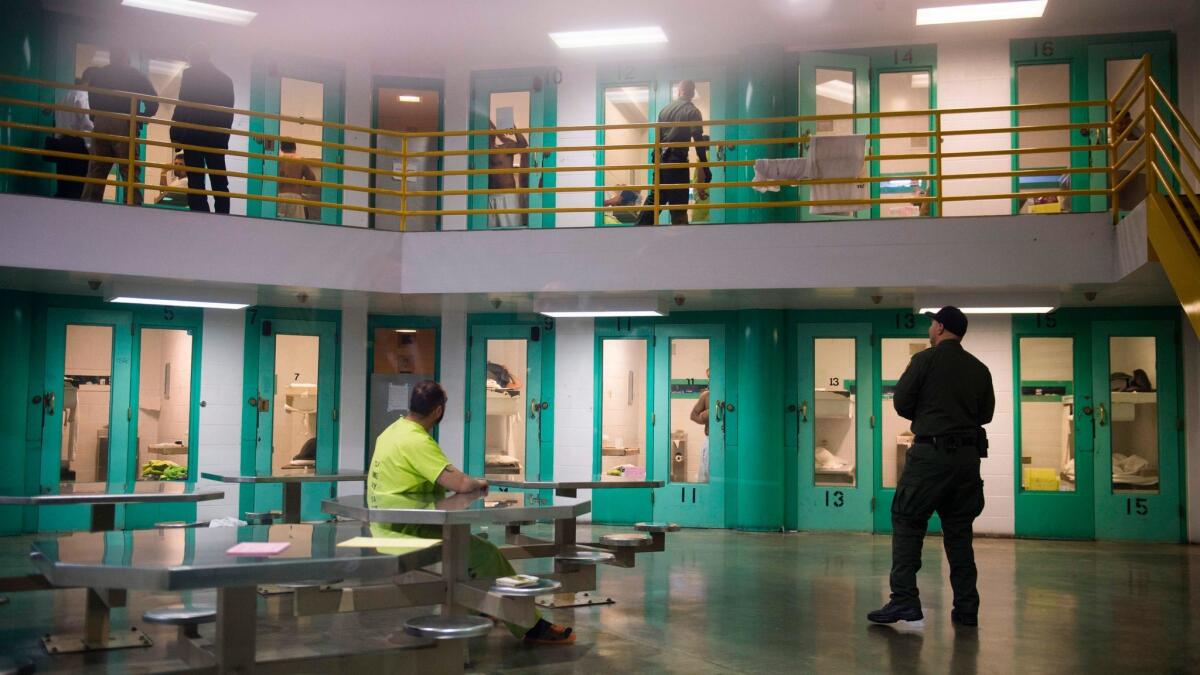Commentary: O.C. Supervisors’ decision to expand detention program overlooks jail conditions

The Orange County Board of Supervisors has voted to expand immigration detention at the Theo Lacy Facility by 120 people (“O.C. supervisors agree to expand immigrant detention in county jails,” May 11). This comes just two months after the Office of the Inspector General at the Department of Homeland Security released a report on alarming conditions at Theo Lacy, which include “24-hour solitary,” “serious safety concerns,” “horrific conditions” and “spoiled food and moldy showers” (“Spoiled food and moldy showers: Poor conditions for immigrant detainees in O.C. jail, report says,” March 8).
The Board of Supervisors recently heard two hours of public comments from community members opposing the expansion and detailing horrific conditions at Theo Lacy. The board’s vote was swift and unanimous.
Members wore green ribbons for foster families and mental health awareness — two areas of need worsened by immigration enforcement in Orange County. Board members did not see the irony. Or perhaps they simply chose to look away from the suffering caused by immigration detention.
Supervisors did not cite the real motivation behind their decision: the $5 million a year the county will receive from the federal government for the contract expansion. Instead, they attempted to moralize their decision. Supervisor Shawn Nelson argued that “we have no choice” in the federal government’s decision to detain immigrants, and it is at least “more humane” to detain Orange County residents closer to their families.
Clearly, Nelson does not understand how the immigration detention system works. A system designed to remove people from society can never be humane.
Most people detained at Theo Lacy are not from Orange County. Out of the hundreds of immigrants our organization, Community Initiatives for Visiting Immigrants in Confinement (CIVIC), visited last year in Orange County immigration detention, only a handful of people were local.
Many detained immigrants are recent asylum seekers from Bangladesh, Haiti, Guatemala, El Salvador, Ghana, India, Ethiopia, Cameroon and many other countries. They are detained at Theo Lacy simply because they are asking the U.S. government for protection from persecution in their home countries. Other immigrants are picked up by ICE across the United States and transferred to Theo Lacy, away from their families.
People in immigration detention do not have a right to a court-appointed attorney. Less than 9% percent of the people we work with at Theo Lacy are represented by counsel, which is below the national average. This reality is partially due to the fact that humane conditions in immigration detention facilities are not written into law, and therefore, are unenforceable.
The national standards for maintaining ICE facilities require access to lawyers, visitors, medical care and proper nutrition, but these standards are merely guidelines and are often violated. It is unclear whether Orange County’s modified contract with ICE is even going to incorporate these basic standards, as the Trump Administration is curtailing them to entice counties to open up more immigration detention bed space.
It is time to pass California’s Senate Bill 29, “the Dignity Not Detention Act,” which would make the standards enforceable statewide, including four immigration detention centers run by private prison corporations.
People in immigration detention at Theo Lacy continue to be held in restrictive housing modules, which the Inspector General had noted as a violation of national standards.
The Board of Supervisors has failed the people of Orange County. Immigration detention should not be used as a way to pad the county’s budget. It is time to end the ICE contract and invest in community-based alternatives to detention that are proven to be more cost effective and that make our communities safer and healthier.
Community Initiatives for Visiting Immigrants, or CIVIC, has republished a copy of the Inspector General’s report on our website, endisolation.org. We will not let the county silence the truth.
JAN MESLIN is director of social change development at Community Initiatives for Visiting Immigrants in Confinement, or CIVIC.
TINA SHULL is a research fellow at CIVIC and a history lecturer at UC Irvine.
CHANSA KAPIJIMPANGA is a small business owner in Orange County and has been detained at Theo Lacy since Sept. 20.
All the latest on Orange County from Orange County.
Get our free TimesOC newsletter.
You may occasionally receive promotional content from the Daily Pilot.



